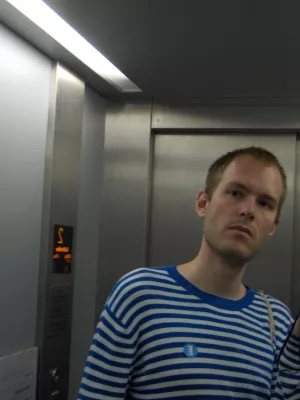
Jacob Korczynski
Doktorand

A bullet stuck in the chest partakes in the life of the body : Nan Hoover, Annabel Nicolson, Kasper Feyrer & Tamara Henderson, Sergei Eisenstein, Ursula Mayer, Richard Serra, Dziga Vertov
Författare
Other contributions
- Nan Hoover
- Annabel Nicolson
- Kasper & Tamara Feyrer & Henderson
- Sergei Eisenstein
- Ursula Mayere
- Richard Serra
- Dziga Vertov
Summary, in English
Independent curator Jacob Korczynski was invited to review the film collections of both the Stedelijk and EYE, to discern similar strategies and approaches between the historical Russian Avant-Garde and the post-war neo-avant-garde, including the work of contemporary video artists. The two screening sections of the program feature films from Malevich’s contemporaries Sergei Eisenstein and Dziga Vertov alongside films and videos by Julia Feyrer & Tamara Henderson, Nan Hoover, Ursula Mayer, Annabel Nicolson, and Richard Serra.
A film scenario and a series of preparatory drawings are all that remain of Kazimir Malevich’s sole film project, an unfinished collaboration with Hans Richter initiated in 1927. While he never produced work that appeared on screen, Malevich’s critical contribution to the cinematic discourse of his contemporaries can be found in his writings on film, largely published in the second half of the 1920s.
The title of this program is taken from the writings of Russian critic Viktor Shklovsky. The bullet and the body he refers to are the work of the Peredvizhniki (The Wanderers), a group of itinerant, self-organized Russian artists active in the late nineteenth century, and the persistence of their practice into the modernist era, despite the disparity between their own realist aesthetic and the movements of non-objective painting that flourished in Russia at the outset of the twentieth century.
Here, the bullet lodged in the central narrative of abstraction and Malevich’s practice includes Eisenstein and Vertov. The theatricality of the former and the documentary strategies of the latter connect to the presence of these impulses within Malevich’s oeuvre, as encountered in Kazimir Malevich and the Russian Avant-Garde. The two screening sections in this program are each anchored by a single film by Sergei Eisenstein and Dziga Vertov. These are shown alongside films and videos by Julia Feyrer & Tamara Henderson, Nan Hoover, Ursula Mayer, Annabel Nicolson, and Richard Serra that connect with the historical material in their similar approaches, vocabularies, and artistic strategies.
A film scenario and a series of preparatory drawings are all that remain of Kazimir Malevich’s sole film project, an unfinished collaboration with Hans Richter initiated in 1927. While he never produced work that appeared on screen, Malevich’s critical contribution to the cinematic discourse of his contemporaries can be found in his writings on film, largely published in the second half of the 1920s.
The title of this program is taken from the writings of Russian critic Viktor Shklovsky. The bullet and the body he refers to are the work of the Peredvizhniki (The Wanderers), a group of itinerant, self-organized Russian artists active in the late nineteenth century, and the persistence of their practice into the modernist era, despite the disparity between their own realist aesthetic and the movements of non-objective painting that flourished in Russia at the outset of the twentieth century.
Here, the bullet lodged in the central narrative of abstraction and Malevich’s practice includes Eisenstein and Vertov. The theatricality of the former and the documentary strategies of the latter connect to the presence of these impulses within Malevich’s oeuvre, as encountered in Kazimir Malevich and the Russian Avant-Garde. The two screening sections in this program are each anchored by a single film by Sergei Eisenstein and Dziga Vertov. These are shown alongside films and videos by Julia Feyrer & Tamara Henderson, Nan Hoover, Ursula Mayer, Annabel Nicolson, and Richard Serra that connect with the historical material in their similar approaches, vocabularies, and artistic strategies.
Publiceringsår
2013-11-24
Språk
Engelska
Dokumenttyp
Utställning
Förlag
Stedelijk Museum
Ämne
- Visual Arts
Status
Published